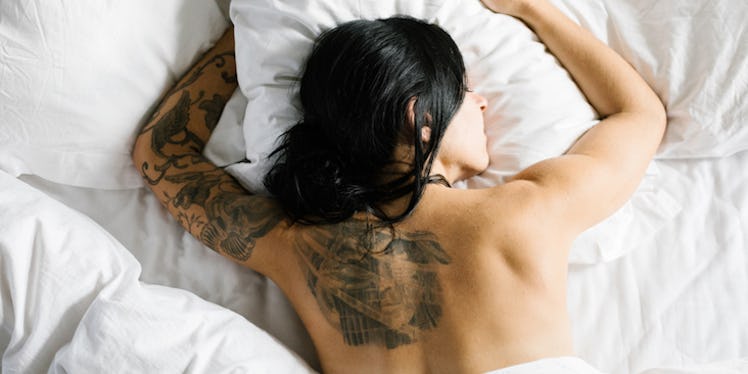You know what it's like.
Your breasts are so tender, the slightest touch brings you a surge of discomfort.
You can't enjoy sex like you usually do because, well, easy on the nipples, please.
To say the least, there's a lot going on during your menstrual cycle. Your uterus is shedding its wall, your hormone levels are unpredictably rising and falling, and your body is literally preparing for fertilization (honestly, the female anatomy sounds like a heroic machine).
But the sore boob situation, which 72 percent of women deal with every month, is just too much for this heroic machine to handle. I need some answers, and I need them now.
If you and your sore boobs are also in need of some answers, here's why your chesticles are aching so much when you're on your period.
Hormones Rise And Fall During The Menstrual Cycle
It really is as simple as that.
In the beginning of your cycle, estrogen increases and then peaks right before your mid-cycle, which causes your breast ducts to enlarge.
Couple that with your body's production of progesterone, which leads to swollen milk glands, and voilà, you're sore AF.
If Your Pain Feels Really Debilitating, Then It May Be A Biological Condition
Fibrocystic breast condition (FBC) essentially causes your breasts feel so tender and lumpy that it hurts to hug someone.
But, don't worry, there's no need to freak out if you have FBC. Those lumps may be large and super uncomfortable, but they're completely benign, and they'll shrink once you're done menstruating.
Plus, you're not alone. According to Mayo Clinic, more than half of women will experience these types of changes in their breasts at some point in their lives.
But You Don't Need To Be Stuck With The Pain
For women with simple hormone fluctuations, feel free to tell people to kindly stay away from your chesticles until the soreness goes away.
However, for more advanced relief, over-the-counter medicine can be a great option. In an interview with Elite Daily, Dr. Jennifer Wider, M.D., author of "The Savvy Woman Patient," provides some key tips on what to look for in your medication.
Dr. Wider suggests,
You can do a non-steroidal anti-inflammatory medication, which is a non-prescription medication like acetaminophen [Tylenol] or ibuprofen.
Dr. Wider also recommends taking the medication "even before it starts, and that will help prevent the pain, especially if women are joggers, or have large breasts, or the pain gets in the way of their daily functioning."
Magnesium supplements, which can be purchased over the counter as well, can also help relieve cyclic breast pain by lowering inflammation and reducing tenderness, says Dr. Wider.
And Then There's Birth Control
Dr. Wider explains,
For some women, birth control pills can reduce breast pain and swelling before a period. The synthetic hormones get in the way of the body's natural hormonal fluctuations. This may help reduce pain for some women.
However, she says, birth control is kind of a weird thing.
She continues,
Some women would say that birth control actually increases the breast pain. What birth control does and the symptoms it can alleviate, may vary by person.
If Medication's Not Helping, Your Bra Could Be The Culprit
According to Dr. Wider, many women simply aren't wearing the right bra for the size of their breasts.
She stresses the importance of paying attention to how a bra feels on your body. Do the straps feel uncomfortably tight? Are you getting enough support from your cup size?
She says,
You may want to wear a sports bra or something that allows the breasts to swell without confining them, and that may help alleviate the pain a little bit.
Ultimately, Dr. Wider says it's extremely important to know the state of your breasts:
It's so important to do the proper exams. This way, if anything changes, you're a patient that can bring any change to the attention of a health care practitioner.
Don't be afraid to approach your doctor regarding pain relief options.
Remember, your body is heroic.If your body deserves anything, it deserves relief.
